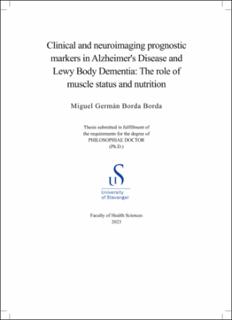| dc.contributor.advisor | Aarsland, Dag | |
| dc.contributor.advisor | Vik-Mo, Audun | |
| dc.contributor.advisor | Oppedal, Ketil | |
| dc.contributor.advisor | Brønnick, Kolbjørn | |
| dc.contributor.author | Borda Borda, Miguel Germán | |
| dc.date.accessioned | 2023-05-16T11:51:51Z | |
| dc.date.available | 2023-05-16T11:51:51Z | |
| dc.date.issued | 2023 | |
| dc.identifier.citation | Clinical and neuroimaging prognostic markers in Alzheimer's Disease and Lewy Body Dementia: The role of muscle status and nutrition by Miguel Germán Borda Borda, Stavanger : University of Stavanger, 2023 (PhD thesis UiS, no. 694) | en_US |
| dc.identifier.isbn | 978-82-8439-159-5 | |
| dc.identifier.issn | 1890-1387 | |
| dc.identifier.uri | https://hdl.handle.net/11250/3068193 | |
| dc.description.abstract | Alzheimer's Disease and Lewy body dementia are the two most common neurodegenerative dementias. They have a progressive course with devastating consequences for the people living with these diseases and their families, but there are large individual variations. Finding early markers and markers of progression and prognosis could promote actions to improve the quality of life of the people affected with these diseases. Nutrition and muscle status are closely related and have systemic functions and interactions that affect the brain. This thesis describes the role of nutritional and muscle status biomarkers in the prognosis of people diagnosed with mild Alzheimer's disease, Lewy body dementia, and mild subjective cognitive decline.
Methods
For the aim of this thesis, I used data from 2 community-based prospective Norwegian multicenter cohort studies: DemVest (The Dementia Study of Western Norway) and DDI (Dementia Disease Initiation). In DemVest, patients with mild dementia, defined as a Mini-Mental Status Examination (MMSE) score; equal or higher to 20 or Clinical Dementia Rating (CDR) global score equal to 1, with different types of dementia, were included. The DDI study was designed to investigate early cognitive impairment and dementia markers. DDI participants included in this thesis were those classified as having Subjective cognitive decline (SCD) according to the SCD-I framework. Comprehensive clinical assessments, including measures of cognition, daily functioning and anthropometric measurement, blood samples, and brain MRI were performed in both studies. Brain morphology was studied using FreeSurfer segmentation and muscle morphology using slice O-Matic software.
Results
This thesis findings first indicate that nutritional status has an essential role in the 5-year prognosis of people living with dementia in the capacity to perform daily life activities and mortality. Second, the quality of the muscle, here the muscle of the tongue, and its amount of fat infiltration were associated with malnutrition onset in people with dementia. Finally, in patients with SCD, muscle function measured with the timed up and go test (TUG) was associated with cognitive decline. TUG, in addition, was associated with cortical thickness in areas related with cognitive and motor functioning.
Conclusion
Nutritional and muscular status predict prognosis in people with SCD and with dementia. These findings suggest that interventions focused on these areas may improve outcomes such as cognition, function, and survival in these groups. | en_US |
| dc.language.iso | eng | en_US |
| dc.publisher | University of Stavanger, Norway | en_US |
| dc.relation.ispartofseries | PhD thesis UiS; | |
| dc.relation.ispartofseries | ;694 | |
| dc.relation.haspart | Paper 1: Borda MG, Ayala Copete AM, Tovar-Rios DA, Jaramillo-Jimenez A, Giil LM, Soennesyn H, Gómez-Arteaga C, Venegas-Sanabria LC, Kristiansen I, Chavarro-Carvajal DA, Caicedo S, Cano-Gutierrez CA, Vik-Mo A, Aarsland D. Association of Malnutrition with Functional and Cognitive Trajectories in People Living with Dementia: A Five-Year Follow-Up Study. J Alzheimers Dis. 2021;79(4):1713-1722. doi: 10.3233/JAD-200961. PMID: 33459715. Due to copyright restrictions, this paper is not avilable in the institutional repository. | en_US |
| dc.relation.haspart | Paper 2: Borda MG, Bani Hassan E, Weon J, Wakabayashi H, Tovar-Rios DA, Oppedal K, Aarsland D, Duque G. Muscle volume and intramuscular fat of the tongue evaluated with MRI predict malnutrition in people living with dementia: a five-year follow-up study. J Gerontol A Biol Sci Med Sci. 2021 Aug 2:glab224. DOI: 10.1093/gerona/glab224. Epub ahead of print. PMID: 34338751. Due to copyright restrictions, this paper is not available in the institutional repository. | en_US |
| dc.relation.haspart | Paper 3: Borda MG, Ferreira D, Selnes P, Tovar-Rios DA, Garcia-Cifuentes E, Jaramillo-Jiménez A, Kirsebom BE, Dalajer T, Oppedal K, Sønnesyn H, Fladby T, Aarsland D. Timed Up and Go in People with Subjective Cognitive Decline Is Associated with Faster Cognitive Deterioration and Cortical Thickness. Dement Geriatr Cogn Disord 51, 63-72 (2022). | en_US |
| dc.rights | Copyright the author | |
| dc.subject | demens med Lewy-legemer | en_US |
| dc.subject | demens | en_US |
| dc.subject | Alzheimer | en_US |
| dc.subject | neurodegenerative disease | en_US |
| dc.title | Clinical and neuroimaging prognostic markers in Alzheimer's Disease and Lewy Body Dementia: The role of muscle status and nutrition | en_US |
| dc.type | Doctoral thesis | en_US |
| dc.rights.holder | ©2023 Miguel Germán Borda Borda | en_US |
| dc.subject.nsi | VDP::Medisinske Fag: 700::Klinisk medisinske fag: 750::Nevrologi: 752 | en_US |
